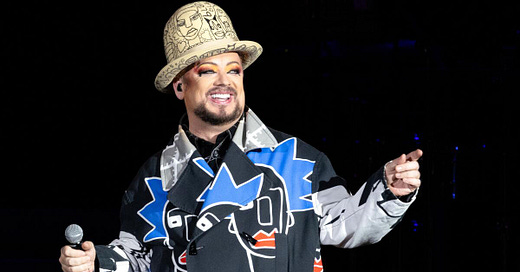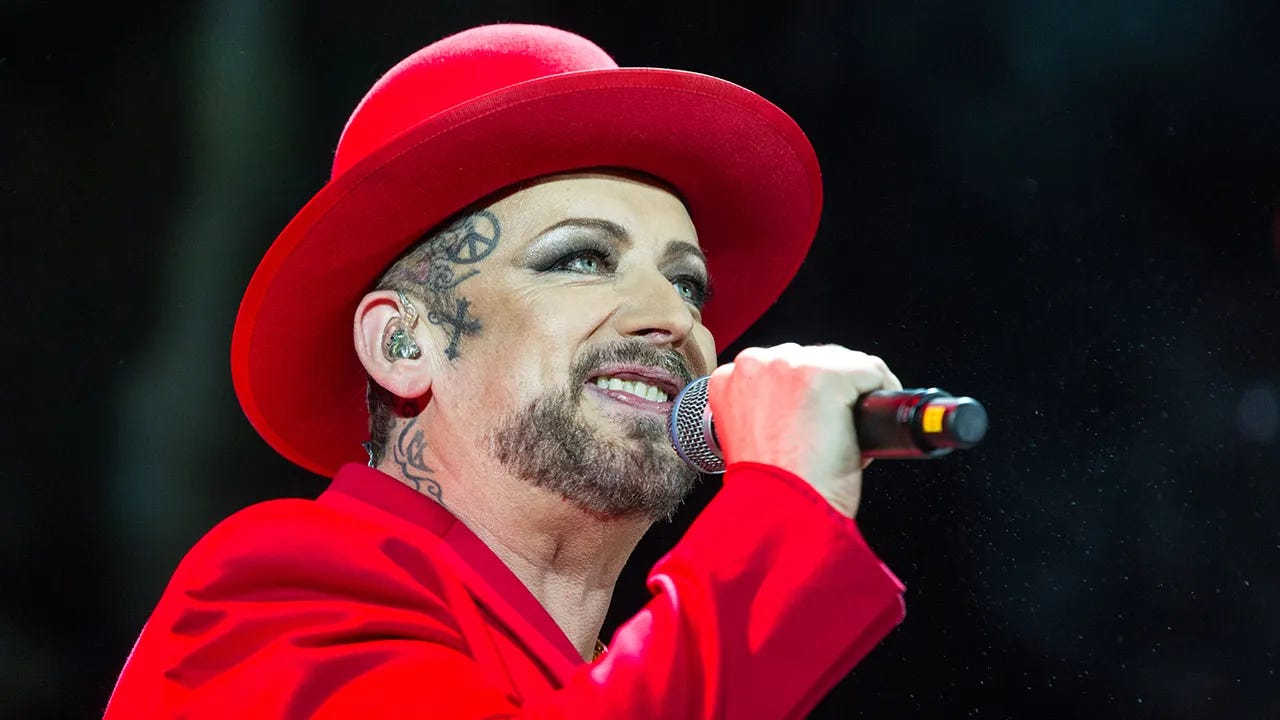Anti-Boy-George Psychomechanics
Let’s workshop this poem about living in a recidivist era where, in a fuck you to the work of gender-stereotype smashers like Boy George, we seem to have reverted to 1950's style male-female norms.
scent of the day: Opus IV, by Amouage. Opus IV—an aromatic spicey-green heavy-hitter (one the best in the Opus line)—opens with a citrus spice (coriander, rose, elemi) that for the first few seconds (perhaps because of the labdanum base) calls to mind the leather-saffron genre—that is until an Opus-VII-reminiscent pea-pablum galbanum rises along with a blasphemous combo of church incense (elemi, olibanum) and a Kenzo-Jungle cumin that (amplified by the bitter cardamom, anisic caraway, and musky civet) comes off more aromatic (more powdery, more ozonic, due to the violet) than in Fate Man (whose own cumin, while heavier in dose, is comparatively blunted, like saltiness in a sauce is by heavy cream, by a labdanum of Laudano-Nero proportions).
Anti-Boy-George Psychomechanics That cutter discomfort in his skin he felt seeing (even just imagining) his peers seeing how grotesque, unconvincing (unfuckable, except in violence), he appeared as a girl— that only fueled his rage against whiteness and its liveliest arm (the anti-trans arm), the nightmarish reign of which he regarded his discomfort as (my-truth-era) cogito proof. And with this rage (knowingly impotent, knowledge only the highest victims share) he leaned further into the role, the disguise (the disguise he knew to be disguise—a fact he took as further proof of the elbow reach). He bought new wigs for ponytails and bangs, a Braun wet-dry epilator (Black Friday sale), and various other transformer goodies— all on Amazon (despite white supremacy): Transformations Labs’s breast-plump serum; two how-to manuals on MTF voice training (From Baritone to Barbie: A Vocal Journey and Femme-Phonics: Hacking Validation, both promising to help transitioners “enjoy a semblance of safety in an unsafe world”); Unclockable’s pool tuck kit, which came with a silver estrogen molecule neckless “for free, because being trans is a gift”). He scrubbed his online profiles so that none linked to birth-family boyhood, every pixel calibrated to feminine hobbies performed with smaller strides and delicate gestures as if to revive the oven-apron fifties of Sears— as if his real affliction was more like depression (depression, he would agree, of growing up with anti-trans violence in every textbook). His calves betrayed him. So he skipped meals and stopped taking stairs with a fury matched by his cursing of misgenderers, deadnamers. And yet all this correction only added to it: that cutter discomfort in his skin he felt.







“Anti-Boy-George Psychomechanics" is a visceral exploration of the inner turmoil, societal pressures, and self-perpetuating cycles of identity reconstruction experienced by a transgender individual navigating a hostile cultural landscape. The poem examines the protagonist's "cutter discomfort," a profound dysphoria intensified by their acute awareness of external judgment and their own efforts to create a socially acceptable feminine persona. This discomfort, rooted in both personal and societal rejection, serves as a dual-edged catalyst: it propels the protagonist to lean into their transformation while also deepening their rage against systemic structures of "whiteness and its liveliest arm (the anti-trans arm)." The conflation of personal dysphoria with systemic oppression amplifies the protagonist's sense of victimhood, transforming their physical and emotional struggles into symbolic resistance against a perceived "nightmarish reign."
The poem's detailed catalog of transformative tools—epilators, wigs, voice-training manuals, breast-plumping serums, and gender-affirming accessories—underscores the commodification of identity within capitalist frameworks, even as it highlights the protagonist's reliance on these products to construct a semblance of safety and validation. The irony of purchasing these items through platforms like Amazon, which the protagonist associates with systemic oppression, reflects the contradictions inherent in navigating an identity that is both deeply personal and deeply politicized.
The protagonist's meticulous efforts to erase traces of their "birth-family boyhood" and curate an online identity steeped in exaggerated femininity evoke themes of erasure, performance, and the external validation sought in a world perceived as inherently hostile. The poem critiques the societal structures and internalized ideals that compel such relentless self-editing, as well as the paradox that these efforts often deepen the very dysphoria they aim to alleviate. The "cutter discomfort" that permeates the poem becomes a symbol not only of gender dysphoria but of the broader existential anguish of trying to reconcile an authentic self within a framework that demands conformity to conflicting ideals.
Ultimately, the poem navigates the intersection of personal identity, societal expectations, and systemic oppression with an unflinching gaze, offering a poignant meditation on the costs—both emotional and existential—of self-creation in a world that often resists it.
gender dysphoria, transgender identity, societal pressure, systemic oppression, commodification of identity, online persona, anti-trans violence, self-construction, performance of femininity, identity politics.